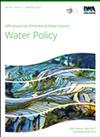不要把所有的鸡蛋放在一个篮子里:以色列海水淡化和水回收的社会视角
IF 1.8
4区 环境科学与生态学
Q4 WATER RESOURCES
引用次数: 1
摘要
以色列制定了广泛采用海水淡化和水回收技术的宏伟目标。以色列的政策制定者认为这些技术是改善城市水安全的关键,但利益相关者对这种政策方法的看法还不清楚。我们采用了Q方法,这是一种定性-定量的方法,以实证方式确定以色列水务部门广泛利益相关者对海水淡化和水回收的社会观点。我们确定了以下四个不同的社会观点:(1)海水淡化应该是最后的选择;(2) 海水淡化正在将我们推向一种无限的资源;(3) 将储蓄等同于资源是一种危险的幻想;以及(4)脱盐是(危险的)电水。这些观点的一个共同特点是认为海水淡化对于一个水安全的国家来说是必要的,但海水淡化不应该是以色列饮用水的唯一来源。我们的调查结果表明,以色列利益攸关方对海水淡化和水回收的利弊以及过度依赖有限水源的风险表现出复杂而偶然的理解。我们讨论了我们的研究结果对以色列和其他缺水地区的水管理和安全的潜在影响。本文章由计算机程序翻译,如有差异,请以英文原文为准。
Do not put all your eggs in one basket: social perspectives on desalination and water recycling in Israel
Israel has set ambitious goals in terms of the widespread adoption of desalination and water recycling technologies. Policymakers in Israel consider these technologies as the key to improve urban water security but knowledge of stakeholder views on this policy approach is not well established. We deployed the Q-methodology, a qualitative–quantitative approach, to empirically determine social perspectives on desalination and water recycling across a wide range of stakeholders in the Israeli water sector. We identified the following four distinctive social perspectives: (1) desalination should be the option of last resort; (2) desalination is moving us to an infinite resource; (3) equating savings to resources is a dangerous illusion; and (4) desalination is (risky) electric water. A common characteristic of these perspectives is the belief that desalination is necessary for a water-secure country, but desalination should not be the only source of drinking water in Israel. Our findings indicate that Israeli stakeholders show complex and contingent understandings of the pros and cons of desalination and water recycling and the risks involved in too much reliance on a limited number of water sources. We discuss the potential implications of our findings for water management and security in Israel and other places with water scarcity concerns.
求助全文
通过发布文献求助,成功后即可免费获取论文全文。
去求助
来源期刊

Water Policy
环境科学-水资源
CiteScore
3.10
自引率
12.50%
发文量
81
审稿时长
6-12 weeks
期刊介绍:
Water Policy will publish reviews, research papers and progress reports in, among others, the following areas: financial, diplomatic, organizational, legal, administrative and research; organized by country, region or river basin. Water Policy also publishes reviews of books and grey literature.
 求助内容:
求助内容: 应助结果提醒方式:
应助结果提醒方式:


